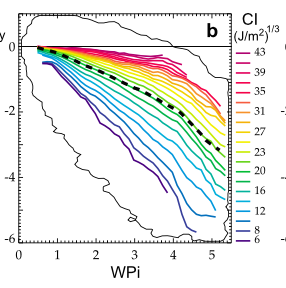Assessing the Oceanic Control on the Amplitude of Sea Surface Cooling induced by Tropical Cyclones
Abstract
Tropical cyclones (TCs) induce sea surface cooling that feeds back negatively on their intensity. Previous studies indicate that the cooling magnitude depends on oceanic conditions as well as TC characteristics, but this oceanic control has been poorly documented. We investigate the oceanic influence on TC-induced cooling using a global ocean model experiment that realistically samples the ocean response to more than 3,000 TCs over the last 30 years. We derive a physically grounded oceanic parameter, the Cooling Inhibition index (CI), which measures the potential energy input required to cool the ocean surface through vertical mixing, and hence accounts for the pre-storm upper-ocean stratification resistance to TC-induced cooling. The atmospheric control is described using the wind power index (WPi), a proxy of the kinetic energy transferred to the ocean by a TC, which accounts for both the effects of maximum winds and translation speed. The cooling amplitude increases almost linearly with WPi. For a given WPi, the cooling amplitude can however vary by an order of magnitude: a strong wind energy input can either result in a 0.5°C or 5°C cooling, depending on oceanic background state. Using an oceanic parameter such as CI in addition to wind energy input improves statistical hindcasts of the cold wake amplitude by ∼40%. Deriving an oceanic parameter based on the potential energy required to cool the ocean surface through vertical mixing is thus a promising way to better account for ocean characteristics in TCs studies.


